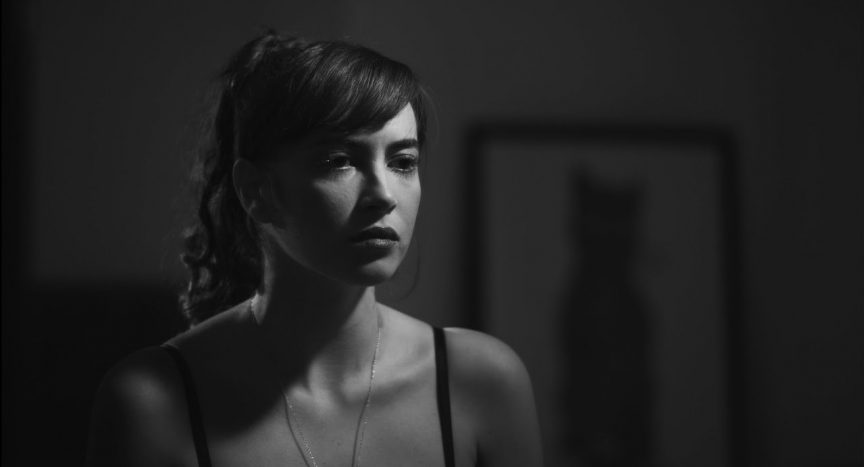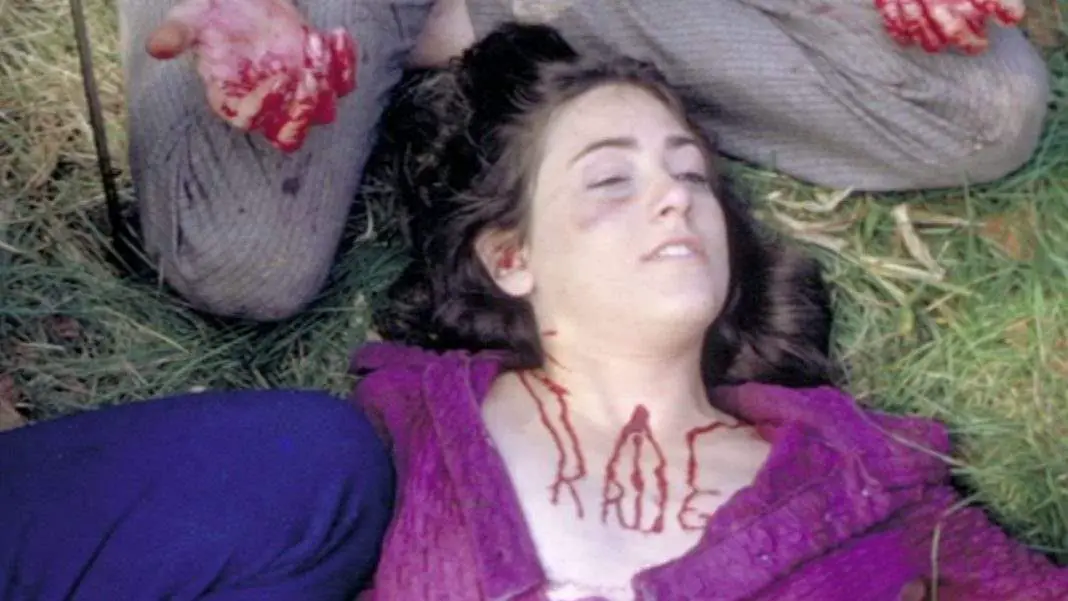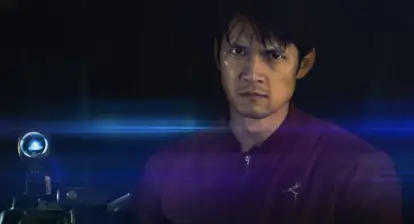Late nights. Loud music muffled to a thump as sweaty bodies sway. Black Medusa‘s Nada (Nour Hajri) spends her evenings in a world of dives and dance floors. Young and beautiful, she has a ready supply of suitors without ever speaking a word. The opening credits sequence has barely rolled before she’s found someone who suits what she’s looking for.
The pair heads back to the unnamed man’s apartment. Nada is stone sober, but her companion is clearly wasted. It isn’t surprising that he passes out shortly after they arrive at his home. Nada just barely manages to get his unconscious body onto the bed rather than the floor. What looks initially to be a courtesy quickly spirals into the shocking, as Nada savagely assaults him with a broom handle while he is passed out.
Black Medusa weaves an arresting quilt out of the duality of Nada’s life. By day she’s a solitary, near silent (communicating via the text to voice app on her cell phone) employee of a tech company. She goes to work, and goes to work out, a beautiful blank with a sideline in graphic design. 
By night, she’s something far more predatory and sinister. Men are all too willing to fill the silence she provides, using her as a confidant for their various hang-ups, and opening themselves up to being victims of her ever-escalating penchant for violence. These attacks, her way of balancing the scales for a violation she is implied (via a surreal, nightmarishly suggestive dream sequence) to have suffered at the hands of an unnamed assailant some years before.
With its rape-revenge hook, Tunisian setting, and moody black and white visuals, the few available English language reviews of the film have often reached for its surface level kinship with both A Girl Walks Home Alone At Night and Promising Young Woman. However, Black Medusa lacks the sharp edged pulpiness of the former, and is far more confident in its narrative and moral ambiguity than the bitter pills in a sugar coating coda of the latter.
Also See:Monster Within: Seven of the Most Unconventional Revenge Horrors
Imed Alissaoui’s stunning cinematography makes the city of Tunis almost a billed character, long tracking shots emphasizing Nada’s solitude, the bright glare of streetlights illuminating nightspots that make even the most joyful revels seem more seedy than celebratory. It’s capital city as personal purgatory, an endless parade of winding streets and leering men, the only punctuation to Nada’s isolation.
While even the most violent moments in the film are not visually explicit, Omar Aloulou’s score and Amal Attaia’s sound design make them palpable jolts by contrast to the rest of the film. Every push of a blunt instrument, every wet slash of a knife, every scrape of grasping fingernails across the fabric of Nada’s clothing is hellishly loud and too close for comfort. Once the deed is done, it’s back to the distant rumble of voices in the city streets and melancholic bits of somber scoring drifting into the soundscape. Only the sharp tap of Nada’s heels on the pavement is front and center in the mix, alone again, as always.
If there are any pithy comparisons to be drawn here, a film noir inflected riff on Ms. 45 would be slightly more apt, but still imperfect. Black Medusa’s pacing is quite measured, and its tone is more forlorn and somber. Nada is briefly offered a reprieve from her vigilante path when a co worker attempts to make a connection with her, but even those efforts are too late to stop the cyclical nature of abuse and trauma. The suffering caused by the sexual assault Nada endured has now spilled over into a downward spiral of both sexual and physical violence. She’s lost the ability to connect with people in any other lens than her own rage.
Also See: Angry Planet: Great Revenge Horror Movies from Around the World
The ambiguous nature of the film’s approach to the narrative and philosophical questions it raises is further obscured by allusions to poetry, mythology, and even a brief flirtation with the supernatural in the form of an ancient dagger. Black Medusa is oddly hypnotic in its meditation on the repetitive patterns of violence. The fact that the movie does so without the catharsis in vengeance that usually accompanies that depiction is sure to frustrate some viewers, who would likely prefer a more definitive resolution.
Nada instead remains a cipher, and the audience is left to draw their own conclusions. If this particular woman has become a monster, it is the destruction caused by men that made her that way.
For those who prefer a more clear cut avenging angel, the gaze of this particular Medusa will likely be found to have been ineffective. For audiences with the patience for its meditatively paced melancholia, this is a unique take on a familiar subgenre. Black Medusa wraps its bleak outlook in a carefully crafted, moody aesthetic. Despite the inertia that mars the third act, it’s too transfixing of a combination to look away.
WICKED RATING: 7.5/10







